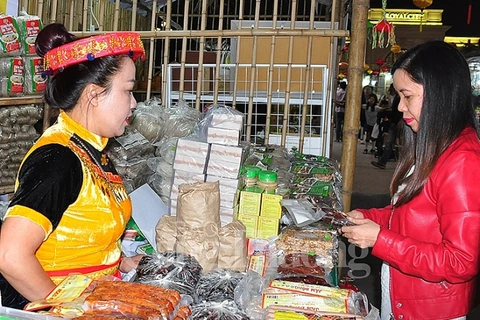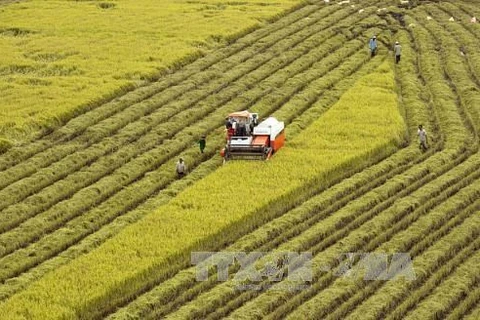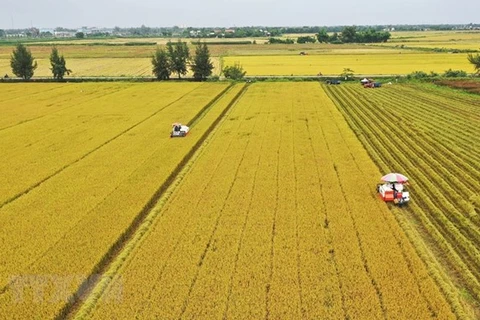Hanoi (VNA) – It is crucial to deploy measures to support the preservation of farm produce and post-harvest storage in parallel with the development of a modern trading system, according to experts.
Despite great demand, the development of safe farm produce chains has faced difficulties, while in many localities, farmers have still been struggling to sell their products.
According to experts, the situation was resulted from small-scale production without linkage.
Unstable market
Thanks to the favourable weather conditions, the northern province of Hoa Binh has long been famous for good agricultural products such as orange, grapefruit, sugar cane, pork, hill chicken and Da River fish.
According to Nguyen Huu Tai, head of the Agro-Fisheries Quality Management Sub-Department under the provincial Department of Agriculture and Rural Development, HoaBinh’s farm produce have met the VietGAP standard with strict quality management to ensure safety.
However, the sales of the products in other localities have stayed modest. It is estimated that Hanoi has consumed about 20-30 percent of the total farm produce of HoaBinh.
“The reason behind the situation is a lack of large-scale production facilities with close connection with distributors. At the same time, consumers in the capital city have yet to receive enough information about the origin of the products, while the product introduction and selling system has remained small in scale,” said Tai.
Meanwhile, agricultural products in traditional markets are more competitive in terms of price and distribution system, he added.
Nguyen Trong Long, Director of the Hoang Long breeding and service cooperative in ThanhOai district of Hanoi, said that the whole production process of the cooperative is closed from breed production to slaughtering and processing stages, thus ensuring food safety. However, the consumption has remained modest, he added.
“This is because consumers have still got confused while choosing safe food in the market,” said Long.
Promoting linkages
With the population of about 10 million, the demand for farm produce of Hanoi is high. On average, the city consumes about 7,000 tonnes of food and foodstuff each month, mostly rice, poultry, and aquatic products.
Particularly, consumption in festivals and Lunar New Year occasion often rise from 5-21 percent, while production facilities in Hanoi only meet 30-60 percent of the demand.
Despite the great demand in Hanoi, only 20 percent of farm produce and food are distributed through supermarkets, and the rest 80 percent are sold in traditional markets.
According to Tran Thi Phuong Lan, Vice Director of the Hanoi Department of Industry and Trade, said that due to the unqualified quality of the products, many have yet to meet standards of supermarkets. In reality, many products fail to meet food safety criteria and do not have labels and codes as well as food safety certificates.
Moreover, in order to be qualified for supermarkets and modern retail channels, the goods must satisfy conditions of safe production and requirements of supermarkets.
“When accepting a product, supermarkets will check it on the spot. If the goods’ contents exceed the safety indicators, the whole batch of goods will be destroyed and the contract with the supplier will be voided. Therefore, farmers and cooperatives must pay special attention to safe production to ensure their goods’ quality,” said a representative from Big C supermarket.
In order to promote the sales of agricultural products, Vu VinhPhu, former President of the Hanoi Association of Supermarkets, said one of the crucial solutions is building the infrastructure system for production and distribution to reduce the production costs.
He suggested the formation of wholesale markets and trading floors for agricultural products to ensure transparency and better management of food safety. Alongside, it is necessary to foster the link among farmers, the State, scientists, enterprises, banks and distributors, thus forming sustainable production and selling chains.
He pointed to the need to support the preservation and storage of agricultural products in parallel with the fast development of a modern trading system as well as adequate investment in the establishment of strong firms in production and distribution.
The Ministry of Industry and Trade should increase training courses for agricultural businesses on criteria for accepting products for sale in foreign-invested retail chains such as MM Mega Market, AEON, Big C and Lotte, thus strengthening their connections with the retailers for better sales./.

























